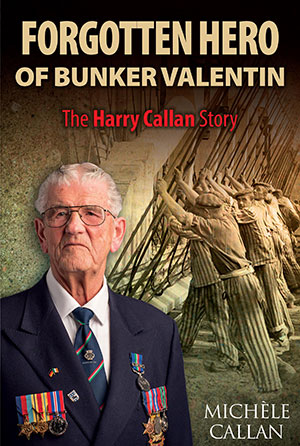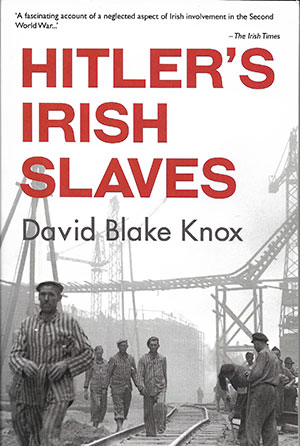FORGOTTEN HERO OF BUNKER VALENTIN: the Harry Callan story
Published in Book Reviews, Book Reviews, Issue 5 (September/October 2017), Reviews, Volume 25MICHELE CALLAN
Collins Press
€14.99
ISBN 9781848893016
HITLER’S IRISH SLAVES
DAVID BLAKE KNOX
New Island Books
€15.95
ISBN 9781848405967
Reviewed by: David O’Donoghue
David O’Donoghue is the author of Hitler’s Irish voices (Somerville Press, 2014).


It’s a bit like the old Dublin bus joke: you wait for ages and then two come along at once. In this case you wait 70 years and then two books on the same subject come along almost together. They’re about 32 Irish sailors who were captured aboard British merchant naval ships during the Second World War. All ended up in a forced labour camp near Bremen, but only 27 lived to tell the tale. And it is a horrific story of brutality, mistreatment and murder by SS guards at the top-secret Farge camp. The notorious Bunker Valentin was designed for the construction of a new type of super-submarine, known as U-boat XXI.
In the event, not a single such vessel was ever launched. The project, begun in 1943, was too little too late. U-boat XXI was meant to regain the upper hand for the Germans in their war against the Atlantic convoys, but the Nazis wreaked more havoc with Werner von Braun’s V1 and V2 unmanned rockets, which caused death and destruction in south-east England, including London, in the latter stages of the war. Some 25 years later the Americans won the space race, landing astronauts on the moon in 1969, thanks to von Braun’s expertise.
Although both books deal ostensibly with the same subject, they read like two different stories. Forgotten hero of Bunker Valentin: the Harry Callan story (written by his daughter-in-law Michele Callan) is an upfront, eyewitness account of what happened. It is also a touching, human story of this Derry man who survived an SS labour camp against all the odds. Written in the first person, it is a detailed and valuable document.
I cannot recall another history book whose foreword comprises a terrifying description of a nightmare, one of countless such episodes that Callan experienced in the post-war years. Of course, it begs the question as to why no post-traumatic stress disorder counselling was offered to people like Harry Callan after the war. In his memoir, Callan describes how he and other Irish ex-inmates of the Farge camp were aghast when one of their number told his story to the Irish Times in late 1945. But it is clear that the ex-inmate who told his story to the newspaper actually did himself a favour by not keeping the horrible memories bottled up inside.
The second book, Hitler’s Irish slaves (first published in 2012 under the less obvious title Suddenly while abroad), is David Blake Knox’s account of his distant cousin, William Hutchinson Knox, who did not make it out of Farge alive. The author explains that ‘the last of the Irish seamen to die was my cousin William. There is some uncertainty about the immediate cause of his death: it has been attributed to dropsy, to cancer, and to inadequate medical treatment.’ Dr Heidbreder operated on the Irish prisoner (inserting a tube into his side to drain fluid from his stomach) but he died three days later.
One can only assume that Dr Heidbreder did his best, with few drugs and no anaesthetic available. In fact, Harry Callan makes it clear that, far from being a Dr Mengele figure, the Farge camp doctor showed the Derry man a degree of kindness by transferring him to work in the garden of his family home in view of the Irishman’s weak physical state. This may well have saved Callan’s life.
Blake Knox claims that the Irish were picked to work at Bunker Valentin because of their nationality, yet Harry Callan is clear that Russians, Poles and Jewish prisoners (the latter transferred from concentration camps) received much harsher treatment. Blake Knox notes, however, that French prisoners ‘recorded one of the highest rates of mortality’ in the camp.
While Harry Callan’s book is an intensely personal account of how he coped with the war and with life after his wartime experiences, David Blake Knox’s work reads like a lament for a long-lost globe-trotting cousin who had all but disappeared from the family tree. Since William Hutchinson Knox perished in the camp, we will never get to hear his version. We must therefore make do with a fairly pared-down account of someone about whom not much was known, even within his own family.
Blake Knox makes up for this lack of knowledge by taking his readers on a number of personal grudge trips. He justifiably singles out Charles Bewley, our pro-Nazi diplomat in Berlin from 1933. To de Valera’s credit, he sacked Bewley in 1939, but not before the attaché had done his best to block as many Jewish refugees as he could from reaching Ireland. Blake Knox also has a go at Bewley’s successor, William Warnock, but overlooks Dan Binchy, who was at the Irish legation in Berlin from 1929 to 1932 and loathed Hitler. Harry Callan is fairer in assessing the Irish foreign service, noting that Con Cremin responded to a letter from the Irish prisoners at Farge by visiting them and reporting back to Dublin on their whereabouts. Callan feels that this may have spared them further brutal treatment. At one point, the Irish were about to be taken by ship from Flensburg to neutral Sweden, but in 1944 their safe passage could not be guaranteed. To be fair to Cremin, he did his level best in very difficult circumstances, as the Third Reich collapsed around him.
















